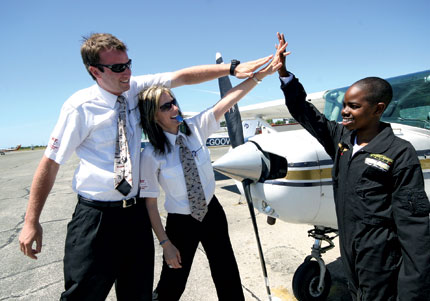 Yesterday, as we were taxiing back for yet another dash down the runway to defy gravity, I started laughing out loud. My student asked what I was laughing about and I said, “The thought just crossed my mind that, at this exact moment, my daughter is on set in Toronto producing her first movie, my son is negotiating with several agencies that are competing fiercely for his scripts, Marlene is making a name as a ceramicist and I’m sitting in my favorite airplane doing what I love to do. Life is good for the Davisson tribe, and I can’t keep from laughing.”
Yesterday, as we were taxiing back for yet another dash down the runway to defy gravity, I started laughing out loud. My student asked what I was laughing about and I said, “The thought just crossed my mind that, at this exact moment, my daughter is on set in Toronto producing her first movie, my son is negotiating with several agencies that are competing fiercely for his scripts, Marlene is making a name as a ceramicist and I’m sitting in my favorite airplane doing what I love to do. Life is good for the Davisson tribe, and I can’t keep from laughing.”
From beginning to end, this week has been an incredible high: Both of my kids appear to be realizing their dreams in so many different ways. And that means that I too am realizing my dreams; being a parent means that if your kids are happy, you’re happy too. And believe me, I’m happy. And to answer your next question, no, neither of them fly.
It’s a common assumption that pilots want their kids to fly, but in my case, that’s simply not true. I want my kids to be what they want to be. Period. Besides, them not flying means I have one less thing to worry about.
It’s known far and wide that I’m a worrier. I, however, prefer to characterize my mode of thinking as preparing for emergencies (e.g., each and every time the throttle goes forward, I automatically assume the engine’s going to quit, and plan accordingly). I guess I do that so much that it carries over into my nonaviation life and makes me look like a born-again pessimist: I assume things are going to go wrong and make mental preparations for plan B. In flying, I don’t think we have any other choice.
A good percentage of what we train for in aviation could be labeled “disaster prevention,” but that doesn’t stop us from loving and enjoying what we do. It’s not a negative way of thinking; it’s pure common sense.
As for my kids not flying, I don’t see that as a negative because they’ve both developed the one thing that I think is necessary in a human being and that’s a driving passion for what they do. I’ve never cared what my kids did for a living as long as they went after it with passion and made it more than a job. They should make it who they are, not what they do. And they’ve both done that in spades. Besides, it’s not necessary that they, or anyone else, fly to be considered a complete person.
Flying isn’t for everyone and it definitely isn’t for those who are incapable of developing a passion for it. People who view flying as just something to do (rather than a deep-seated passion) will develop the skills, but the skills will be floating on top of their shallow interest; they won’t develop the depth that comes from learning with passion. Being totally out-of-your-mind in love with something like flying means you can’t do it enough, can’t learn enough and you’re always out there flipping over rocks looking for the next hidden morsel of knowledge or the next cool airplane.
Most importantly, passion is the fuel that keeps you going when life tosses obstacles in your way. For most people, just about everything having to do with aviation is inconvenient, and obstacles keep popping up that would drive the average person nuts. For one thing, although we can engage in the cerebral aspects of aviation at home (reading, movies, etc.), to actually engage in the activity itself means we have to drive to another location that’s sometimes a fair distance from home. (Note: To those of you living on airparks: Yes, we’re all jealous.) Then, if we’re conscientious, we’ll spend an inordinate amount of time carefully examining the device we’re about to fly (is that negative thinking?), and then we strap in knowing it’s going to cost us a sizeable amount of money.
If we own the airplane, the obstacles multiply. Simply finding a home for an airplane is usually a challenge (sometimes an impossible one). For instance, the waiting list on my hangar is something like six years long. In other places I hear it’s even worse.
And then there’s the maintenance: Is an airplane ever 100% right? There always seems to be some niggling little thing that needs to be fixed, and even the little things are expensive. And when a big maintenance item comes along, it’s always a choker. But we don’t mind, because that’s part of the game we love. We may not love spending money, but we do love the game enough to figure out how to make it work. It’s our passion that bulldozes the obstacles flat. If you’re not truly in love with it, the obstacles will wear you down, and you’ll slowly slide out of aviation and find something that isn’t constantly testing you.
I used to chide my kids that show business was the world’s most difficult way to make a living. Then I think about aviation, which is also renowned for not being an easy place to turn a buck. My kids have done very well financially and, so far, nothing I own has been repossessed, so apparently I’m also able to pay my bills—all of which is a testament to the power of passion.
I guess the bumper-sticker philosophy behind all of this is, “If you love it enough, you’ll eventually succeed. If you don’t love it, get out: We only have one life and it would be a bummer to waste it.”
Budd Davisson is an accomplished aviation writer and photographer, CFII & CFIA, aircraft owner and builder. He has authored two books and lectured at the Smithsonian and NASA’s Langley Research Center. Check out his Website at www.airbum.com.

